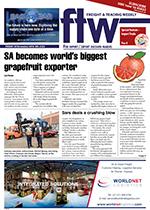I t is no secret that trade is under pressure. Over the past decade, the South African economy has grown at an average annual rate of only 1.4%. Coupled with an unstable policy and regulatory environment, a weak currency and state capture, the high levels of concern are understandable. FTW spoke to industry experts to determine the top challenges importers are facing at present.
The unstable political environment The country seemed to be in a constant state of turmoil, said Clifford Evans, customs liaison manager for Berry & Donaldson. “Stateowned enterprises and other government departments are the subject of investigations into mismanagement, state capture, overspending, abuse of power and corruption which inevitably leads to uncertainty and mistrust,” he said. “This, in turn, leads to a fluctuating rand which negatively impacts imports as well as exports. Fighting within the various political parties does nothing to improve the economy in relation to imports and a stable political environment is needed in order to create new import business opportunities.” Political shenanigans were directly impacting importers, said another customs expert, who preferred not to be named. “The political game playing has led to the appointment throughout customs of inexperienced staff. There is a glaring lack of the appropriate technical knowledge and experience.” This, he said, resulted in delay upon delay. According to Anup Rampiar, operations manager at Ameropa Commodities, delays with Sars are an increasing concern. “Getting a release in place can be problematic,” he said. “In most cases, releases are received in a reasonable amount of time but in some instances, we experience extended delays from Sars with obtaining the release or resolving a query.” The Single Window Concept In many countries, the single window has been in use for years where all parties involved in the supply chain have access to the same information at the same time using the same system as the customs authority. Preventing delays, manual processes, and the same consignment being stopped by different departments more than once, it is a system with numerous benefits. “In South Africa, however, none of the government departments are connected to the Sars Electronic Data Interchange (EDi) system,” said Evans. “These departments include Port Health, Plant Inspector, Daff, NRCS, Medicine Control Council and SAPS. This means that when Sars detains a consignment, each of these departments must be dealt with by submitting documents manually in order to obtain releases – and in many cases, the same consignment is physically inspected by more than one department at different times creating delays and additional costs.” Port efficiency and cost Ask anyone in the supply chain about their concerns and cost is sure to come up. From a port perspective, said Rampiar, berthing delays due to port congestion were becoming an increasing challenge. “It significantly drives up cost. As an importer of bulk agri commodities, we charter bulk vessels, and during peak season one could face high demurrage bills due to port congestion.” South African ports are also amongst the most expensive in the world with tariffs on the increase rather than decline. “Our ports have to be more efficient,” said Evans. “Our infrastructure in the port system is not where it should be and service levels are often questioned. It all drives up the cost.” Rates and surcharges Freight rates have been depressed due to overcapacity, and the building of so many ultra large container vessels hasn’t helped, in the view of Mike Walwyn, chairman of the Cape’s Port Liaison Forum. With carriers struggling to keep heads above water, a plethora of surcharges has been introduced in an attempt to augment revenues. “Then there is the question of demurrage, detention and carrier haulage, which is in a way related to the customs issues, since it usually only arises when there has been some customs intervention. Charges levied by carriers can only be described as eye-watering, and are often not negotiable in any way, as the carrier retains control of the cargo until they are paid,” he said. “Finally, we can look at the local charges paid by importers to LCL or groupage operators. Where importers buy on a CIF or CFR basis, they are laying themselves open to the worst kind of exploitation, as the local agents (no doubt on the instruction of their foreign counterparts) levy hugely inflated charges for unpacking, handling and releasing cargo.” The importer, said Walwyn, very often only discovered this when the consignment arrived and it resulted in bills sometimes higher than the value of the goods. Red tape Importers dealt with red tape and NTBs (non-tariff barriers) daily, said Evans. “Applying for licensing and registration with Sars is a manual process with an enormous amount of irrelevant and duplicated documentation required. This is a time-consuming, labour-intensive exercise leaving most applicants frustrated and possibly preventing them from adding to the economy. Applications for licences and permits from various other government departments follow the same process, NRCS (National Regulator for Compulsory Specifications) being a case in point,” he said.


